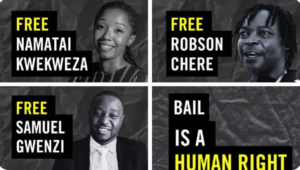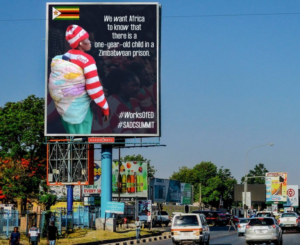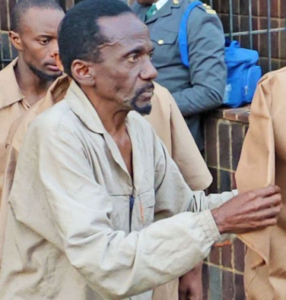ZIMBABWEAN POLITICAL PRISONER’S HEARTFELT PLEA AT UN SUMMIT

Job Sikhala, a former political prisoner from Zimbabwe, gave a powerful speech at the UN 16th Geneva Summit for Human Rights and Democracy. He shared his painful experiences in prison and talked about the severe suppression of democratic freedoms in Zimbabwe. Sikhala, a lawyer and opposition member of Parliament, has been arrested 68 times over his nearly thirty-year political career. His most recent arrest was on June 14, 2022.
Sikhala’s trouble started when he decided to help the family of Moreblessing Ali. Ali was a single mother and opposition political activist who was brutally killed. Her body was found in a deep well, decomposed and dismembered. Because Sikhala got involved in her case, he spent 595 days in pre-trial detention at Chikurubi Maximum Security Prison. During this time, he faced severe human rights abuses. He was kept in solitary confinement, denied food, medical care, and access to his lawyer.
While in prison, Sikhala was treated very badly. He was chained to a hospital bed when he was very sick and faced many trials under doubtful legal reasons. It was clear that the government wanted to silence him before the 2023 elections. His arrest was a strategic move by President Mnangagwa’s government to reduce his political power. This shows the government’s systematic attack on dissent.
Sikhala’s family and supporters also faced harsh treatment. His wife, Ellen, was arrested for a questionable traffic offense to stop her from helping him. His legal practice was broken up. Six University of Zimbabwe students were arrested just for asking for Sikhala’s release, showing the government’s lack of respect for academic freedom and legal rights.
In his speech, Sikhala not only talked about his personal struggles but also the harsh reality faced by many Zimbabweans. He described a country where torture, brutality, and economic destruction are common. The government wants to stop opposition and keep power at any cost. This oppression has not only silenced political opposition but also hurt civil liberties. New laws are threatening to make free speech and peaceful assembly even harder.
Sikhala also talked about how the government’s actions are affecting education and public health. Many young Zimbabweans have bleak futures because education is hard to get and drug addiction rates are rising. He also warned about a coming humanitarian crisis due to climate-induced droughts in Southern Africa. He stressed the need for fair distribution of international aid in Zimbabwe.
Sikhala’s speech at the Geneva Summit was more than just a story of his suffering. It was a call to action for the international community. He asked for global support against the persecution of human rights advocates. He also asked for international support for the National Democratic Working Group (NDWG), a coalition working to restore democracy in Zimbabwe.
By sharing his story, Sikhala seeks justice for himself and his fellow countrymen. He also wants to inspire a united response against tyranny. He ended his speech with a prayer for blessings on all attendees, showing his hope and faith in the power of united global efforts to support human rights and democracy. The international community now has the important task of responding to these cries for help. Silence and inaction will only encourage oppressors and extend the suffering of the Zimbabwean people.




It’s disheartening to see the international community continuously ignore the plight of people like Job Sikhala. His repeated arrests and mistreatment highlight a broken system, yet there seems to be little action taken to address these abuses.
While Job Sikhala’s speech is powerful, it feels like just another tragic story from Zimbabwe that will be forgotten in a few days. The international community’s track record on intervening in such situations is poor. Sikhala’s account of his experiences is shocking, but it’s not surprising given the history of Zimbabwe’s government. Unfortunately, speeches and calls to action often fall on deaf ears, and the cycle of oppression continues.
Job Sikhala’s courage in speaking out at the UN is truly inspiring. His story is a powerful reminder of the importance of standing up for human rights, even in the face of severe repression.
Sikhala’s speech highlights critical issues in Zimbabwe that need global attention. It’s a call to action that we should all heed to support democracy and human rights around the world.
Hearing Job Sikhala’s experiences firsthand underscores the urgent need for international intervention in Zimbabwe. His bravery and resilience are commendable, and his speech could be a catalyst for change